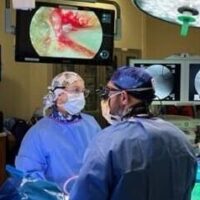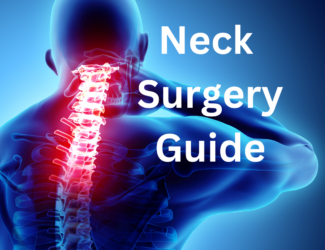If you’ve been dealing with back pain for quite a while, you’ve probably wondered what the signs are that you might need back surgery. I have patients ask me this same question almost weekly. While I always recommend conservative, non-surgical treatment options first, back pain surgery may be the best treatment option if non-surgical treatments have failed and chronic back pain is limiting your daily activities.
Extensive research shows certain spine conditions like disc herniation, spinal osteoarthritis, spinal stenosis, slipped or bulging disc, or degenerative disc disease may benefit from surgery — again, if conservative therapy hasn’t helped. However, some conditions, such as chronic, intractable lower back pain without leg pain, may not be helped by surgery, according to studies such as this one published in Spine Journal.
Before you decide, it’s important to consult with an experienced Denver spine surgeon to review your history of pain, current imaging and treatments you have tried. In addition to “red flag” symptoms — which may require immediate surgery — there are three common signs you need back surgery:
- You have pain that doesn’t go away
- You have pain that radiates to your arms or legs
- You’re getting shorter
Unless you have emergency symptoms of back pain, spine surgery is the last option considered to treat your pain. I’m going to dive into each one of these signs so you have a better idea of what to look for.
1. You Have Pain That Doesn’t Go Away
In most cases, acute back pain lasts a few days to a few weeks. This type of pain can usually be relieved with home remedies like anti-inflammatory medication, ice or heat. Although most people get better, some will continue to experience pain.
Chronic, unrelenting pain can affect your quality of life in many ways. Pain that limits your mobility can impact your job, family, and social life. Plus, chronic lower back pain is exhausting. Pain medication may help for a short period, but it is not a permanent solution and can have unpleasant side effects. There are many types of interventional pain management procedures that also may help, if you are a candidate.
I and my fellow Denver spine surgeons at Neurosurgery One work in teams with advanced practice providers, pain management physicians, and physical therapists to create a personalized plan to effectively treat your back pain. In most cases, you will start with physical therapy and other pain management treatments, such as spinal injections. If those don’t relieve the pain, you’ll be assessed to see if you are a candidate for an interventional pain management procedure, such as spinal cord stimulation. This interactive back pain map shoes the fastest, medically proven path to relieving your back pain.
2. You Have Pain That Radiates to Your Arms and Legs
When your back pain radiates to your extremities, it may indicate pressure on a nerve root of the spine (like a disc that presses on the nerve root). In these cases, surgery may be the best option. Denver neurosurgeons like myself and my colleagues at Neurosurgery One are particularly good at this type of spine surgery because we are specially trained in understanding and treating the nervous system. (Read more about how to select a Denver spine surgeon.)
There are many causes of radiating spinal pain, including osteoarthritis, bone spurs, pinched nerves and herniated discs. Spinal cord compression is a serious condition that typically requires surgery because it can cause a loss of function in the arms, hands, legs and feet if it is left untreated for too long.
Chronic back pain is often the result of spinal osteoarthritis. Over time, the articular cartilage of the spinal joints can wear away. This can lead to bone-on-bone contact and become very painful.
With a disc herniation, the inner jellylike layer of the spine protrudes through the outer, tougher layer. If this herniation presses on a nerve root, it results in ongoing pain and discomfort. If the affected disc is in the lower, or lumbar, part of your spine, it can put pressure on your sciatic nerve. That often causes a condition called sciatica where pain runs down one or both legs.
Bone spurs can be a very painful condition. Arthritis is often the cause of this condition, which can put undue pressure on the spine. In many cases, bone spurs are harmless and may cause no pain. But for some, bone spurs are more serious. They can grow over time and may compress the spinal nerves, resulting in pain, tingling, or weakness. The pain often radiates to the extremities.
3. You’re Getting Shorter
Osteoporosis and other diseases can weaken the spine. As bones weaken, they can become brittle, and the chances of fractures increase.
Osteoporosis can cause small fractures in the spine that result in a hunched posture or loss of height. This condition is called kyphosis and occurs most frequently in women over the age of 60, who also are at higher risk of osteoporosis in general. In many cases, kyphosis can be subtle and not cause pain. In some people, however, it can cause pain that needs to be treated to avoid immobilization.
The most common surgeries to treat kyphosis are vertebroplasty and kyphoplasty. During these procedures, a special type of “cement” is injected into your spine to help reduce your pain and restore mobility. During kyphoplasty, a balloon is used to help create space between the vertebrae. SpineJack kyphoplasty uses an implant that looks and functions much like a tiny car jack. Two jacks are inserted into the fractured vertebra, then raised to restore the original height of the vertebra. Once the jacks are in place, bone cement is injected around them.
Like all spine surgery, there are pros and cons of these procedures. This is why it’s important to discuss these and alternative treatments with your surgeon.
Is Back Surgery Right for Me?
You don’t have to live with chronic low back pain. Even if you don’t need back surgery, it’s a good idea to consult with an experienced spine surgeon to discuss your options.
Neurosurgery One’s spine surgeons throughout Denver can help you get the proper diagnosis and find the best course of action for treating your pain.
This article was originally published in 2021 and was updated in September 2023. The author, Dr. Angela M. Bohnen, is a board-certified, fellowship trained neurosurgeon who specializes in spine and brain conditions. Dr. Bohnen sees patients at Neurosurgery One’s Littleton and Lone Tree clinics. She treats all types of spine conditions, including herniated discs, lumbar stenosis, radiculopathy, sciatica and other problems that cause pain in the back, legs, neck and arms. Dr. Bohnen completed her fellowship in complex spine surgery, one of two fellowships, at Northwestern University.
Read More About Spine Surgery







